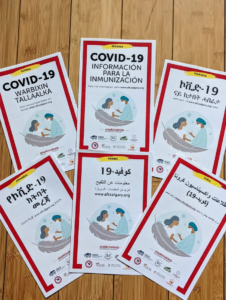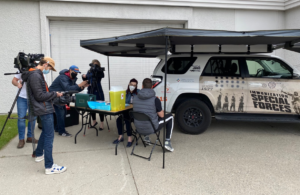Healing Together: how Alberta’s first Indigenous-led COVID-19 clinic vaccinated Calgary’s most vulnerable
In April 2021, Shane Gauthier of the Aboriginal Friendship Centre of Calgary was faced with a question: how do you provide COVID-19 vaccines to people beyond your immediate community who might be facing barriers to access?
It was a question born of unexpected success. One month earlier, in March 2021, the centre – alongside Siksika Health Services, Alberta-based public health tech and services company OKAKI, and a coalition of social service agencies in Calgary – had launched aisokinakio’p, the first Indigenous-led COVID-19 vaccination clinic in Canada.
The original aim of aisokinakio’p (Blackfoot for "a place where you take your body and mind to make it healthy”) was to provide safe, culturally sensitive access to immunizations for Indigenous communities.
From its base at the Circle of Wisdom Elders and Seniors Centre, and later, Best Western Premier Calgary Plaza Hotel & Conference Centre, clients received vaccinations in a room adorned with ceremonial objects, supported by Elders. The welcoming environment was designed to counteract the systemic racism and trauma that had historically prevented many Indigenous people from seeking help within the Western health care system.
“At the start of the COVID-19 pandemic, it was estimated that over 7,000 individuals in the city who face significant barriers in accessing mainstream services may be experiencing vaccine hesitancy,” said Matt Nomura, Vice President of Strategic Investments and Community Impact at Calgary Homeless Foundation.
These individuals include members of the urban Indigenous community, but also people at risk of or experiencing homelessness, and immigrants and refugees recently arrived in Calgary.
For the founders of the clinic, it was important that aisokinakio’p was accessible to other vulnerable groups in the city.
“Over time, the clinic really became a place for all,” said Gauthier. “Our partnership’s approach of sharing, caring and kindness created a safe space and, as a result, we were able to improve the physical and mental health of our most vulnerable community members.”
To ensure the clinic was equipped to care for these populations, founder and medical director of OKAKI, Dr. Salim Samanani, reached out to his connections within the community, and local organizations began partnering with the clinic to provide additional expertise, supports, and services.
From May 24 to June 11, 2021, aisokinakio’p opened its doors to anyone over the age of 12 who was Indigenous, dealing with homelessness, or a newcomer to Canada. Immigrants could access the clinic, thanks to translator services offered by Calgary Catholic Immigration Society, and privacy spaces allowed people with different religious values or needs to feel comfortable when receiving their vaccination.

To overcome vaccine hesitancy and make COVID-19 vaccinations accessible, aisokinakio’p provided information about the clinic in several languages. Credit: Aboriginal Friendship Centre of Calgary
For many people, the clinic was their first exposure to Indigenous-led health care – an experience that proved adaptable enough to address their vaccine hesitancy.
“We had one differently-abled young man who really did not want to be immunized, because he was afraid of fainting in front of people,” said Melissa Roy, Director of Operations for the AFCC. “So Beth Woytas [Director of Clinical Operations at OKAKI] administered the vaccine to him in a privacy space on the floor, because that was where he felt most comfortable.”
The clinic also became a platform for cultural exchange between the Indigenous community and other ethnic groups. In June 2021, the clinic teamed up with the Dashmesh Culture Centre to provide vaccines to Calgary’s Sikh population – a collaboration that highlighted a common value between the Indigenous and Sikh communities: sharing and caring for one another.
Nomura notes that vulnerable communities across the city had access to vaccinations, thanks to this “coalition of leading health and social service agencies.” He praises the clinic’s targeted education campaign in overcoming vaccine hesitancy, and its ability to deliver immunizations through the fixed locations and outreach services.
Since its opening, the clinic has administered more than 10,000 vaccines in and around Calgary. In June 2021, it launched a mobile service, delivering vaccines to people experiencing homelessness or living in affordable housing, as well as to temporary foreign workers on farms, and Afghan refugees resettling across Western Canada, among others.
In fall 2021, the clinic expanded its services to include flu and pneumococcal shots to adults and children over the age of five and is now working with provincial and local governments to improve vaccine access in the eastern part of the city. The clinic is also set to relocate from Best Western to a permanent location in March 2022, procured by the centre with the help of Calgary Homeless Foundation.

The team from aisokinakio’p offering vaccinations through its mobile unit. Visualist Steven Paul Judd gave Siksika Health Services permission to use his striking images of warriors battling disease on the vehicle.
Credit: Aboriginal Friendship Centre of Calgary
Gauthier says aisokinakio’p is a shining example of what can happen when Indigenous organizations are empowered to create solutions in their own communities.
“We are incredibly proud of how, in a time of uncertainty and hardship, we all pulled together to protect and care for our community members. ”
The aisokinakio’p clinic is led by the Aboriginal Friendship Centre of Calgary, with key partners OKAKI and Siksika Health Services.
Community Partners
· Seven Brothers Circle
· Calgary Homeless Foundation
· Metis Nation of Alberta
· Calgary Catholic Immigration Society
· City of Calgary
· Alberta Health Services
· Government of Alberta
· Safeway
· Sobeys
· United Way
· Alberta Dental Association
· Calgary Foundation
· University of Calgary
· Awo Taan
· Dashmesh Culture Centre
Creating Alberta’s first Indigenous-led COVID-19 vaccination clinic
When the COVID-19 pandemic struck in March 2020, Shane Gauthier, CEO of the Aboriginal Friendship Centre of Calgary, knew he faced an uphill battle encouraging the city’s urban Indigenous population to seek vaccination.
“The Indigenous community’s vaccine hesitancy is connected to a history of systemic racism and trauma in the health care system,” Gauthier said. “With that context, we knew we needed to get creative and collaborate with our partners to create something new and different – something that would be Indigenous-led and governed and serve our community from a place of understanding.”
In March 2021, the centre joined forces with Siksika Health Services, OKAKI, Circle of Wisdom Elders and Seniors Centre, and Seven Brothers Circle to launch aisokinakio’p (Blackfoot for "a place where you take your body and mind to make it healthy”), the first Indigenous-led COVID-19 vaccination clinic in Alberta to provide safe, culturally sensitive access to immunizations for Indigenous communities.

The aisokinakio’p team, including Elders and representatives from partner agencies, stand outside the clinic’s second location, Best Western Premier Calgary Plaza Hotel & Conference Centre. Youth from Siksika Nation supplied the teepee, which housed Indigenous clients while they waited for their vaccination appointments. Credit: Aboriginal Friendship Centre of Calgary
Collaborating to Overcome Vaccine Hesitancy
On March 15, 2021, the clinic – funded with the support of Calgary Homeless Foundation – opened its doors at Circle of Wisdom Elders and Seniors Centre in Sunalta. It initially focused on vaccinating Indigenous seniors, and by the time it wrapped operations at that location, 400 seniors had been immunized.
Gauthier credits this success to close-knit partnerships between local organizations and their willingness to create a space where traditional Indigenous medicine and Western medicine could meet to keep the urban Indigenous community safe – culturally and physically.
The collaboration extended from the leadership level to those working on the ground inside the clinics. Led by Dr. Salim Samanani, Alberta-based public health tech and services company OKAKI and nurses from the University of Calgary administered the shots, which were provided by Alberta Health Services.
Staff at Circle of Wisdom Elders and Seniors Centre provided a clean location where clients entered the clinic at one end and exited the other in a perfect circle. Flags of red, yellow, white, black, and blue were blessed and placed around the clinic, which helped the seniors to relax and receive their treatment in a space imbued with ceremony.
Collaboration was also critical to overcoming vaccine hesitancy and removing barriers. The centre held information sessions for seniors, and Beth Woytas, Director of Clinical Operations, briefed administrative staff so they could answer questions from clients. The team also offered wrap-around care. They called Elders directly to book appointments, provided transportation, offered care packages, and reached out with reminders about second dose appointments.
Word about the clinic’s Indigenous-friendly approach to health care spread throughout the community –and from April 14 to 23, 2021, the clinic moved to Best Western Premier Calgary Plaza Hotel & Conference Centre, expanding operations to include the families of seniors and the general urban Indigenous community.
Once again, the collaboration between local organizations ensured the clinic remained accessible and culturally sensitive. Clients got to know their immunizers by reading a short bio about them, accompanied by a photo, before pharmacists from Sobeys and Safeway and members of the Alberta Dental Association administered the vaccines in a space decorated with cultural pieces from Siksika Health Services and Lawrence Gervais, president of Métis Nation of Alberta - Region 3.
Meanwhile, Siksika Health Services and youth from the reserve supplied the tent in the parking lot that housed people waiting for their appointments, and the clinic performed daily smudging ceremonies, with Elders remaining on-site to help people with anxiety.
Creating New Stories
Since its opening, the clinic has administered more than 10,000 immunizations with the support of more than 35 volunteers. As a mark of the clinic’s success in overcoming vaccine hesitancy, in December 2021, aisokinakio’p administered 30-40 immunizations per day – many of them first doses.
The importance of this success is not lost on Gauthier, who describes aisokinakio’p as a blueprint for future urban Indigenous vaccination clinics, with the potential to expand into other health care initiatives.
“To be able to determine how best to serve our people and protect them from this deadly disease in a culturally sensitive way was empowering for all of us,” said Gauthier. “We believe we’ve created something here that can be replicated in other urban centres.”
The aisokinakio’p clinic is led by the Aboriginal Friendship Centre of Calgary, with key partners OKAKI and Siksika Health Services.
Community Partners
- Seven Brothers Circle
- Calgary Homeless Foundation
- Metis Nation of Alberta
- Calgary Catholic Immigration Society
- City of Calgary
- Alberta Health Services
- Government of Alberta
- Safeway
- Sobeys
- United Way of Calgary and Area
- Alberta Dental Association
- Calgary Foundation
- University of Calgary
- Awo Taan Healing Lodge Society
- Dashmesh Culture Centre
